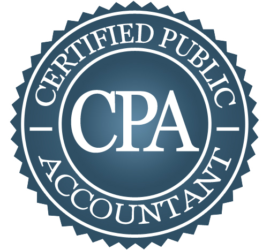January 15, 2019
 by Holly Hunt / January 15, 2019
by Holly Hunt / January 15, 2019

When someone says accountant, what comes to mind?
Money? Math? The accounting cycle?
Accountants tend to operate quietly behind the scenes, but everyone knows they are the backbone of any business’ success. That means they do more than adding up numbers on a Microsoft Excel spreadsheet or using the best accounting software and tracking money. So, what exactly is in an accountant’s job description?
An accountant’s main duty is to prepare and examine financial documents. This can include anything from analyzing data, finance reports, tax returns, budgets, government agency records, compensation, healthcare benefits, and estate planning taxes. Based on these findings, an accountant can then help an organization or individual create a financial goal and plan how to achieve that goal.
Whether you’re thinking about becoming an accountant or hiring one, this article will cover all the basics. We’ll go over:
Accounting isn’t necessarily the most glamorous sounding job, but it is one of the most integral ones. Not everyone is money-savvy, and not everyone has the time to pay careful attention to the comings and goings of their cash – especially business owners who are already spending much of their time creating company goals, interacting with customers, answering to a board, and managing people.
The truth is, without accountants, many companies and individuals would be lost.
Now that you know what accountants do, let’s go over how one becomes an accountant.
There isn’t a black or white answer to the kind of education required to become an accountant.
A certified public accountant (CPA) license is required by most employers. So, to be a marketable accountant, it’s best to get one. The CPA is basically a license to provide accounting services to the public.

In order to attain a CPA, an aspiring accountant must obtain the minimum standard requirements: 150-semester units of college education, pass the Uniform Certified Public Accountant Examination, and one year of accounting related experience. Requirements may vary by state.
On top of being extremely important, the accounting field is surprisingly diverse. There are four main types of accountants, and each offers different career opportunities and growth.
A public accountant is employed by an accounting firm and has a multitude of clients that could be corporations, government agencies, or individuals. A bachelor’s degree and CPA are the minimum requirements for this type of accounting.
|
TIP: Curious what a successful accounting firm looks like? Check out a ranking of the best accounting firms, and read reviews to learn what makes them so successful! |
The career trajectory for public accountants is wide-ranging. They typically can look forward to becoming supervisors and managers. Many public accountants are striving to make partner, or own part of the firm, at the peak of their careers. There is also the potential to open up your own public accounting firm.
Management accountants can also be called cost, managerial, corporate, or private accountants. They are employed by a private individual or firm and do not share findings with the public. Typically, a bachelor’s degree and CPA are required to become a management accountant.
The career trajectory for this type of accounting can include leadership roles within a company, such as accounting manager, chief cost accountant, budget director, or manager of internal auditing. Some can even advance on to careers as controllers, treasurers, financial vice presidents, chief financial officers, or corporation presidents.
These accountants maintain and examine records of government agencies and audit private businesses and individuals whose activities are subject to government regulations or taxations. A bachelor’s degree and CPA are required.
Government accountants have a lot of options for their career trajectories. They can work at the federal, state, and local levels.
On the state and local levels, government accountants can perform compliance and financial audits of local government entities. They can also conduct white-collar crime investigations and manage local revenues.
On the federal level, job opportunities include working for the Federal Bureau of Investigation (FBI), U.S. Department of Treasury, General Services Administration, and the Internal Revenue Service (IRS). Federal government accountants are involved in auditing government agencies and investigating white-collar crimes. They can also testify on audits or tax legislation before legislative committees.
Public and private companies, nonprofit organizations, and government agencies hire internal auditors. These auditors study companies and organizations thoroughly to evaluate their operational efficiency, reliability of financial reporting, information security controls, and compliance with standards.
Another huge part of an internal auditor’s job is investigating and deterring all types of fraud within a company or organization.
Internal auditors act as independent agents who provide objective evaluations and recommendations. Typically, internal auditors report to the audit committee of a company’s board of directors, which helps keep the reporting objective.
A bachelor’s degree is required for entry-level internal auditor positions. If you want an edge in the job market, a Master in Business Administration will help you stand out.
Accounting is not for the faint of heart — it is for the meticulous, keen, and number-oriented. It’s for people who thrive on pressure and deadlines. Everything an accountant does directly impacts the health and wellness of a business, alongside helping guide future decisions. It’s a very black-and-white profession — the job was either done correctly or not.
|
Tip: Check out the best free accounting software to make your job easier! |
If you want to play an integral role in a business or help an individual succeed, then accounting could be right for you!
Interested in seeing a job description? Here’s a listing for a junior accountant position (this is a standard entry-level job) at a consulting firm. You’ll see that there’s a good mix of tracking money, but also thinking strategically about how to improve processes. Many accounting jobs have this nice combination of high-level thinking and attention to detail, in addition to using software such as free invoice software.
Responsibilities for this position will include:
Qualifications:
Is accounting a viable career option for you? Is it a good career choice in today’s economy and world?
The answer is yes.
From: The Bureau of Labor Statistics
Accounting as a profession will see a 10 percent growth from 2016 to 2026, according to the the Bureau of Labor. These accounting statistics display faster than average growth. This growth could be due to recent high-profile fraud scandals, such as those surrounding Wells Fargo and Bernie Madoff. Businesses are desperate to avoid similar scandals and want to ensure their money is in order – making accountants more sought after and valued than ever.
As for salary, accountants’ median annual pay in 2017 was $69,350. The top 10 percent earned over $120,000 in 2017. As you can see, accountants move on to very lucrative careers in under 10 years, based on resume data compiled from job research site Zippia.
When it comes to workload and expected hours, 1-in-5 accountants worked more than 40 hours per week in 2016. Accounting work hours depend on the time of year — during tax season, the days will typically be longer. Tax season for an accountant typically starts the day after New Year’s Day and goes until April 15 (when the deadline is).
Another great pro for the accounting industry is that you can find jobs anywhere. West Coast, East Coast, abroad — everyone needs an accountant, so you can work wherever you want!
If you just entered the industry or are about to, check out these accounting statistics to prepare you for 2019.
Now you have a better idea of what accountants do. It’s a fulfilling job that directly involves you in the success of an individual, company, or organization. If you’re analytical, detail-oriented, and driven, this might be the career path for you!
If you’re here because you’re thinking about hiring an accountant for the first time — I highly recommend doing so! Most companies typically have at least one accountant or bookkeeper to track financial transactions. Handing over the financial responsibilities to someone else will undoubtedly free up your own time for other significant projects.
Happy accounting!
For more basics on accounting, check out how to make a balance sheet and how to calculate gross profit.
Holly is the former Director of Content Marketing at G2. An avid reader and writer, Holly graduated from the University of Missouri with a dual major in Journalism and English. She firmly believes in the power of content and is constantly seeking ways to better engage and delight readers.
Getting started in the accounting industry can be a tall order.
 by Rob Browne
by Rob Browne
Small business is all about bookkeeping.
 by Jazmine Betz
by Jazmine Betz
Getting started in the accounting industry can be a tall order.
 by Rob Browne
by Rob Browne


